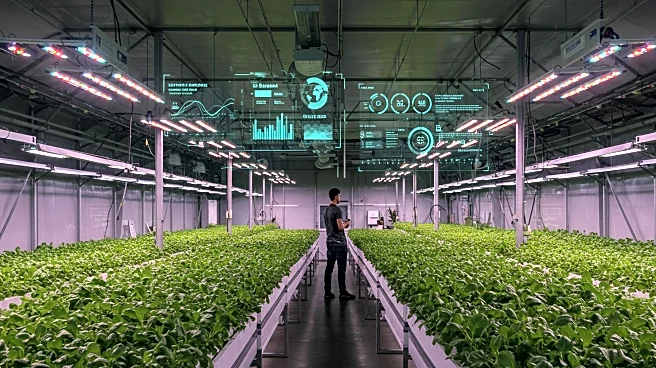What's Happening?
Farmonaut has outlined seven key trends that are set to shape sustainable agriculture by 2025. These trends include precision agriculture, water-efficient irrigation, advanced soil health management, climate-resilient cropping, agroforestry integration, digitalization, and socio-economic transformation. Precision agriculture utilizes satellite imagery and AI to optimize farming processes, while water-efficient irrigation systems aim to reduce water usage by up to 20%. Advanced soil health management focuses on increasing organic matter and microbial activity. Climate-resilient cropping involves diverse rotations and biotech crops to enhance resilience. Agroforestry integrates trees with crops and livestock for improved ecosystem health. Digitalization leverages AI and blockchain for enhanced productivity and traceability. Socio-economic transformation emphasizes equitable rural economies and sustainable business models.
Why It's Important?
These trends are crucial for addressing the challenges posed by climate change and increasing global food demand. By adopting sustainable practices, the agricultural sector can reduce its environmental impact, conserve resources, and enhance food security. Precision agriculture and digitalization offer tools for efficient resource management, while agroforestry and climate-resilient cropping promote biodiversity and resilience. The socio-economic transformation trend highlights the importance of inclusive and equitable approaches to sustainability, ensuring that smallholder farmers and marginalized communities benefit from these advancements.
What's Next?
As these trends gain traction, stakeholders in the agricultural sector, including farmers, agribusinesses, and policymakers, will need to collaborate to implement these practices effectively. Governments may introduce incentives and support programs to encourage adoption. Continued innovation in technology and sustainable practices will be essential to meet the evolving needs of the sector and ensure long-term sustainability.
Beyond the Headlines
The integration of technology and sustainability in agriculture represents a shift towards more responsible and efficient food production systems. This transformation has the potential to redefine global agricultural practices, making them more resilient to climate change and resource constraints. The focus on socio-economic transformation also highlights the role of agriculture in promoting social equity and economic development.










